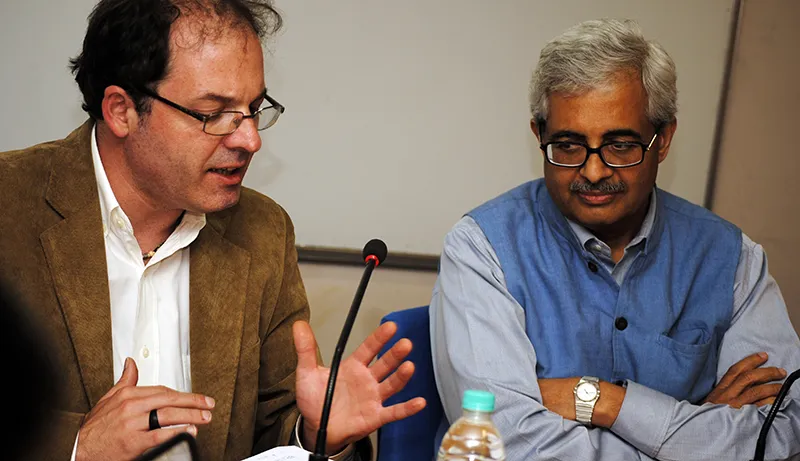-
CENTRES
Progammes & Centres
Location
The Brazilian economy is in a new period of transition. Its challenges today are of tax incentives in order to steer foreign investments towards the domestic shores and curbing rising inequality and urban-rural divide.

What is the new world order in terms of economic might? What is the role of countries like Brazil and India in such a system? What is the role of BRICS in the new world order?
The above questions, among others, were addressed by Prof. Alexandre de Freitas Barbosa, Researcher of Economic History at the Institute of Brazilian Studies, while delivering a lecture at ORF on April 1, 2013.
Barbosa started with a brief introduction of the economy of Brazil. Describing Brazil as a very "complex society", Barbosa listed some major travesties of Brazil. A country which has seen very high growth rate between the 1940’s-80’s, it was one of the most dynamic economies of this era. During this era, the growth of Brazil was surpassed only by Taiwan. It had an integrated and diversified manufacturing economy. However, regional disparities also increased manifold during this era alongwith the rural urban divide and rise in economic disparities. This led to the beginning of formation of a huge external debt, something which began from the late eighties.
With this rising challenge, the Brazilian economy too had to reinvent itself in order to survive in the new global economic order. The 90’s saw the Brazilian growth rate being closer to the Indian Hindu rate of growth i.e. 3.5% annually. This continued till the early part of the new millennium when the dynamism in Brazil market was rediscovered. This reinvention of the dynamism in the Brazilian economy, according to Prof Barbosa, came from the internal market, falling levels of unemployment coupled with increased foreign investments and a marked reduction in economic inequality in the Brazilian society.
According to Prof. Barbosa, the Brazilian economy is in a new period of transition. The challenges of Brazilian economy today are of tax incentives in order to steer foreign investments towards the domestic shores. Also, it has to embark on a export driven model since domestic consumption is not able to drive the economy to desired levels.
The economics of Brazil has also got a lot to do with its foreign relations. The policymakers do not want a new third world driven order but want the world to adapt to a more southern world perspective and how it has changed. Much of this though attributed to the Lula government in Brazil in fact owes its genesis back to the second term of the Cardosa government (Lula’s predecessor). Brazil did not support the northern governments not because of ideological reasons, but because economically it didn’t need the manufacturing markets of the northern countries and instead needed the agriculture markets of these countries to be opened up. Hence, it supported other southern powers like India and China.
This change in the way the world is viewed is also reflected in how Brazil views its relations with the African nations according to Prof. Barbosa. Drawing on historical relations between Africa and Brazil stemming from the fact that a large population of Brazil today are infact descendents of slaves from Africa, Brazil seeks a special relationship with them. Hence, Brazil continues to engage with capacity building in Africa. For example, the Brazilian agricultural research institute has helped its African counterparts in developing agricultural seeds for production in tropical areas rather than exporting the seeds itself. In the words of Prof. Barbosa, this is a unique relationship one that should continue in the future.
During the question and answer session, Prof. Barbosa lauded the success of the Bolsa Familia programme in Brazil as a tool of income augmentation and as a means of alleviating people from poverty. However, he cautioned that it must not degenerate into a poverty eradication ideological programme. Instead, it must be augmented by new ways of increasing income. The challenge before Brazil is not of poverty alleviation, but to curb the rising economic inequality.
Responding to another query, he concurred that he does not believe in the theory that Brazil will fall into a middle income trap since he believes that each country has its own growth trajectory and one model cannot be superimposed on another. At the end, he talked about how capitalism has changed its forms in the modern world. In fact, every country in the world functions in some kind of a capitalist structure. Here capitalism refers to the economic relation between the state and the economy and how this relation is defined. Hence every nation of the world follows its own trajectory of capitalism towards achieving economic prosperity.
(This report was prepared by Ibu Sanjeeb Garg, Intern, Observer Research Foundation, Delhi)
The views expressed above belong to the author(s). ORF research and analyses now available on Telegram! Click here to access our curated content — blogs, longforms and interviews.